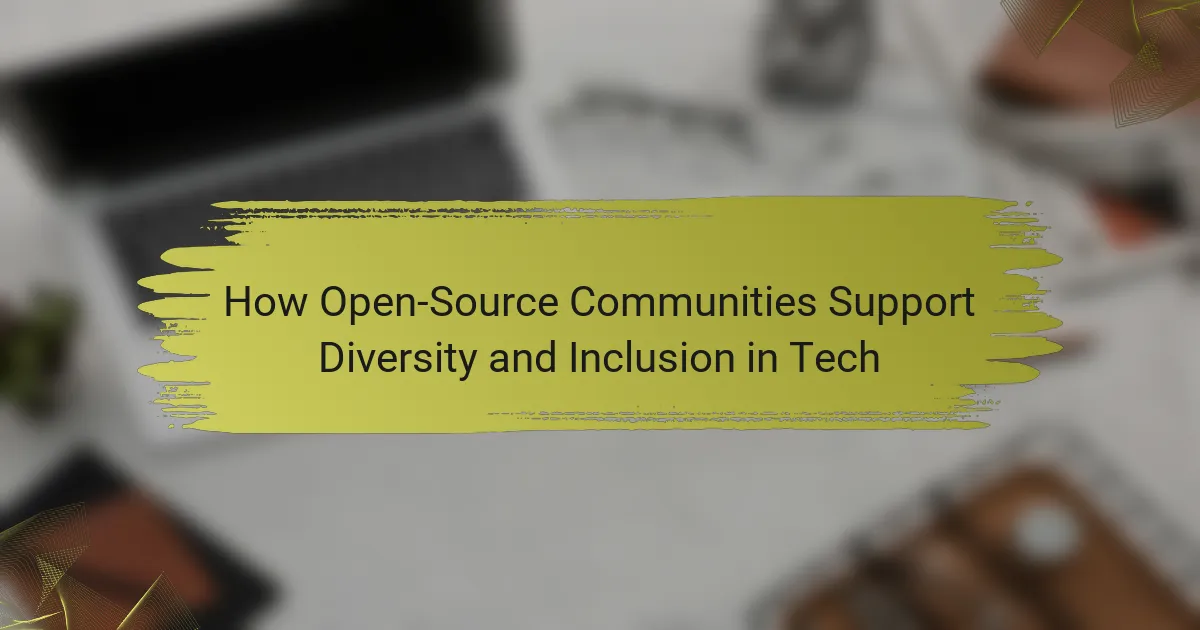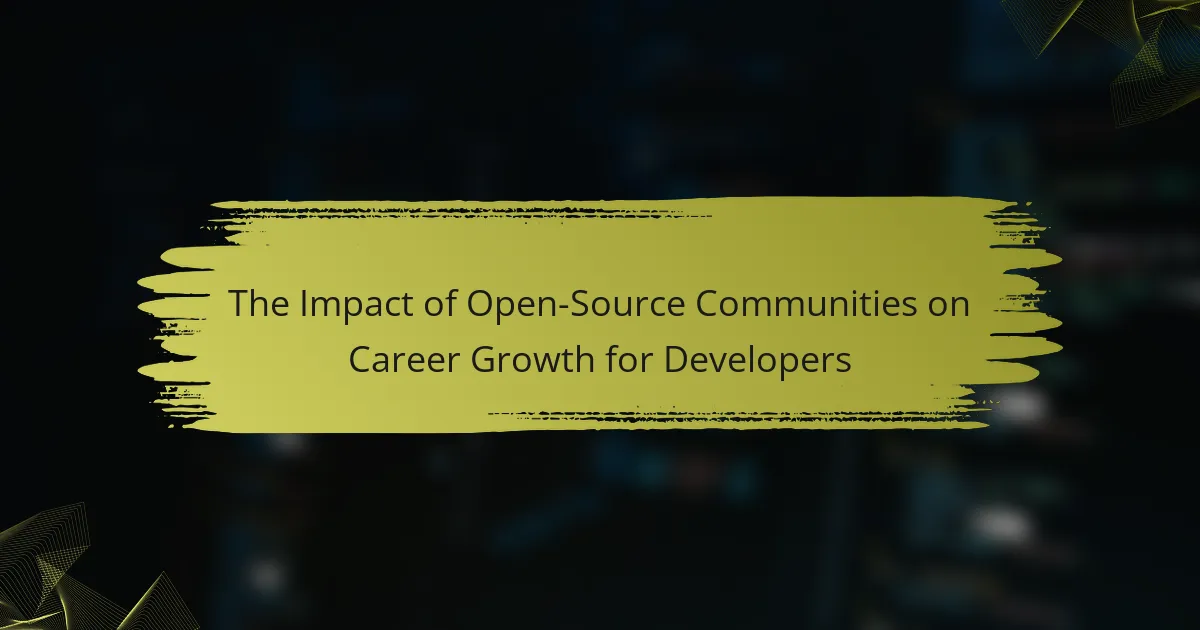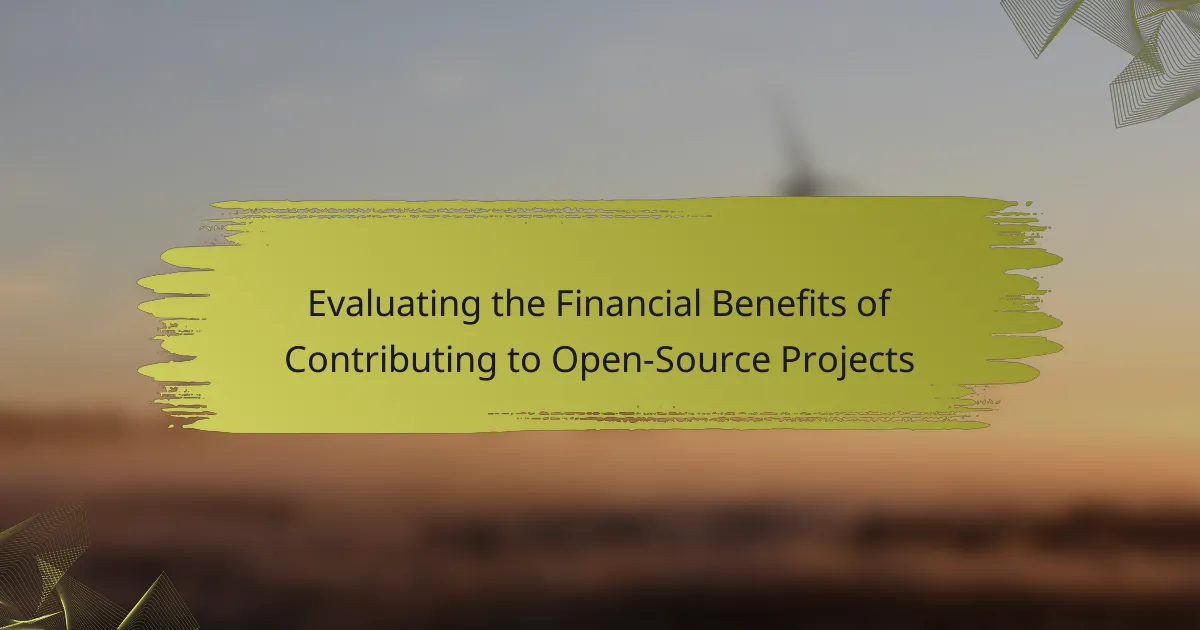Open-source communities are vital in promoting diversity and inclusion within the tech industry by fostering environments that welcome contributions from individuals of all backgrounds. By implementing initiatives aimed at engaging underrepresented groups, these communities create supportive networks that enhance collaboration and innovation, ultimately benefiting the entire technology landscape.
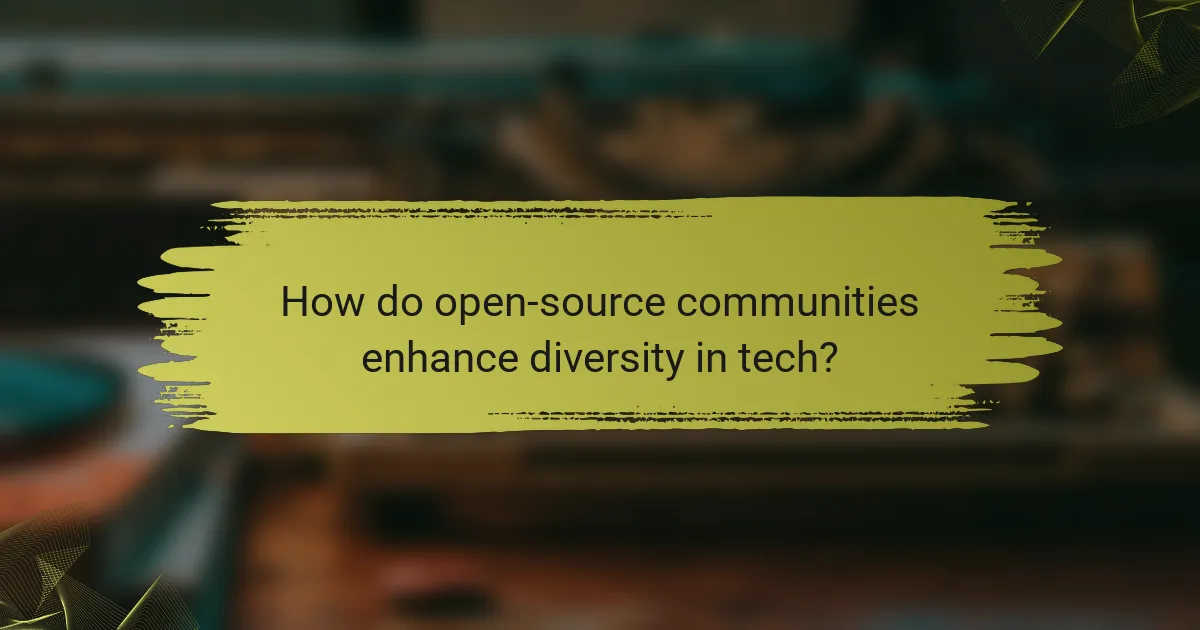
How do open-source communities enhance diversity in tech?
Open-source communities play a crucial role in enhancing diversity in technology by creating inclusive environments that welcome contributions from individuals of various backgrounds. These communities actively promote participation from underrepresented groups, fostering a culture of collaboration and support that benefits everyone involved.
Increased representation of underrepresented groups
Open-source projects often prioritize diversity by encouraging contributions from women, people of color, and individuals with disabilities. This increased representation not only enriches the development process but also helps to create technology that is more reflective of the diverse user base it serves.
Many open-source initiatives implement policies or guidelines aimed at reducing barriers to entry for underrepresented groups. For example, they may provide resources in multiple languages or offer financial support for travel to conferences, making it easier for diverse contributors to engage.
Collaborative projects promoting inclusivity
Collaborative projects within open-source communities often focus on inclusivity by addressing specific needs of marginalized groups. These projects can range from developing software that aids accessibility to creating platforms that amplify underrepresented voices in tech.
By working together on inclusive projects, community members learn from each other and build relationships that transcend cultural and geographical boundaries. This collaboration not only enhances the quality of the projects but also strengthens the community as a whole.
Mentorship programs supporting diverse talent
Mentorship programs in open-source communities are vital for nurturing diverse talent. These programs pair experienced contributors with newcomers from underrepresented backgrounds, providing guidance and support as they navigate the complexities of tech development.
Effective mentorship can lead to increased retention of diverse contributors, as it helps them build confidence and skills in a supportive environment. Many organizations also offer structured mentorship initiatives, which can include regular check-ins, workshops, and networking opportunities to further enhance the experience.
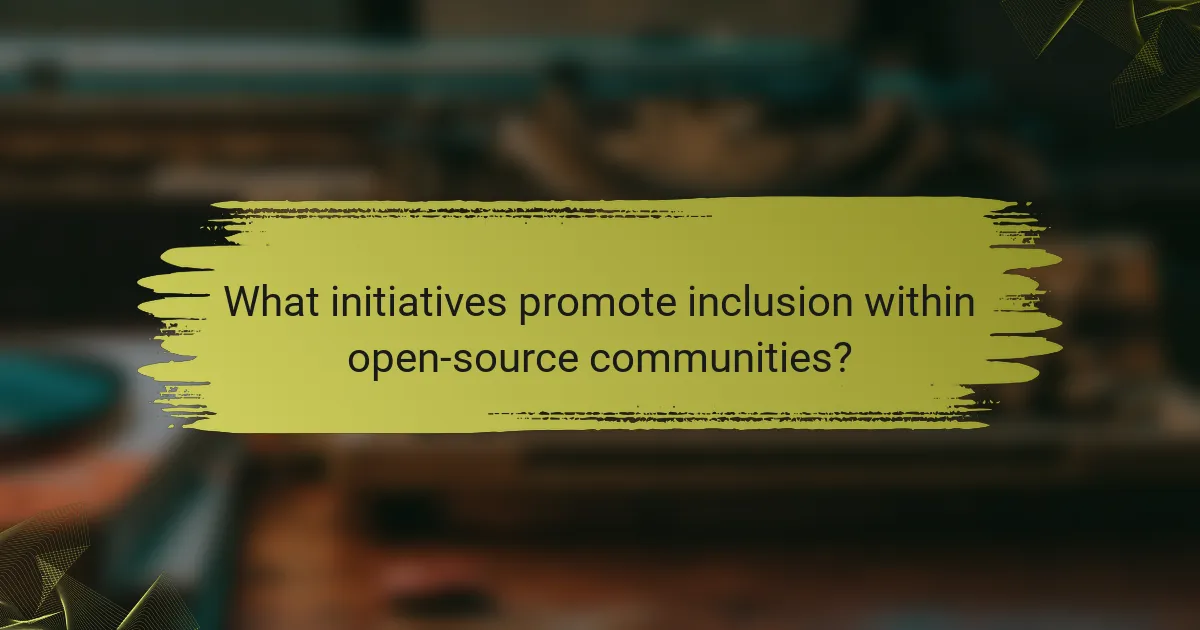
What initiatives promote inclusion within open-source communities?
Open-source communities foster inclusion through various initiatives aimed at increasing participation from underrepresented groups. These initiatives focus on creating welcoming environments, enhancing skills, and building networks that support diversity in technology.
Diversity-focused hackathons
Diversity-focused hackathons are events designed to encourage participation from individuals of various backgrounds, including women, people of color, and [censured] individuals. These hackathons often provide mentorship, resources, and a supportive atmosphere to help participants collaborate on projects.
Organizers typically partner with organizations that promote diversity to ensure outreach and accessibility. Participants can expect to work on real-world problems, gain hands-on experience, and potentially earn prizes or recognition for their contributions.
Inclusive coding workshops
Inclusive coding workshops aim to teach programming skills in an environment that values diversity and inclusion. These workshops often cater to beginners and focus on creating a safe space where participants can learn without fear of judgment.
Common features of these workshops include diverse instructors, hands-on projects, and opportunities for networking. They may also offer scholarships or free access to resources to ensure that financial barriers do not prevent participation.
Partnerships with educational institutions
Partnerships with educational institutions help open-source communities reach a broader audience and promote diversity in tech. These collaborations can involve curriculum development, internships, and joint events that expose students to open-source practices.
By working with schools and universities, open-source communities can provide students with practical experience and mentorship, encouraging them to contribute to projects. Such initiatives often focus on underrepresented groups in tech, aiming to create a more equitable landscape in the industry.
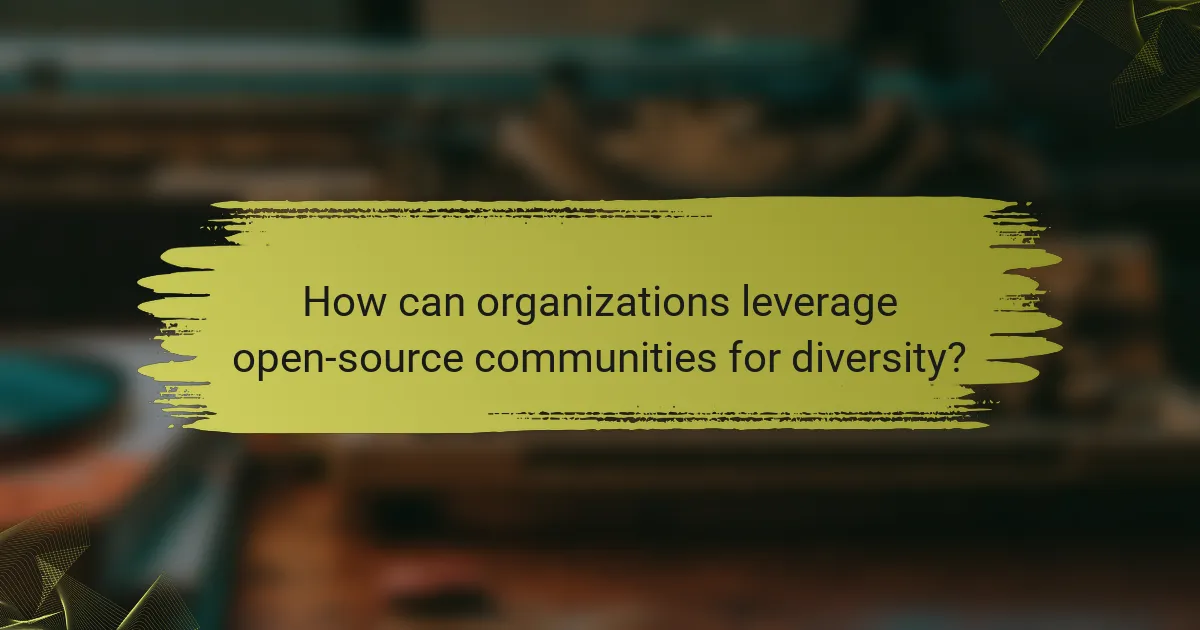
How can organizations leverage open-source communities for diversity?
Organizations can leverage open-source communities to enhance diversity by actively engaging with diverse contributors and implementing inclusive practices. This approach not only broadens the talent pool but also fosters innovation through varied perspectives.
Creating open-source projects with diverse contributors
To create open-source projects that attract diverse contributors, organizations should prioritize accessibility and inclusivity from the outset. This includes providing clear documentation and resources in multiple languages, as well as ensuring that the onboarding process is straightforward for newcomers.
Additionally, organizations can promote their projects in diverse communities and networks, such as women in tech groups or local coding bootcamps. Hosting events like hackathons or workshops specifically aimed at underrepresented groups can also encourage participation and collaboration.
Implementing inclusive policies and practices
Implementing inclusive policies is crucial for fostering a welcoming environment in open-source communities. Organizations should establish a code of conduct that clearly outlines acceptable behavior and consequences for violations, ensuring that all contributors feel safe and respected.
Moreover, offering mentorship programs can help bridge the gap for new contributors, providing them with guidance and support as they navigate the open-source landscape. Regularly soliciting feedback from contributors about their experiences can also help organizations identify areas for improvement and make necessary adjustments.
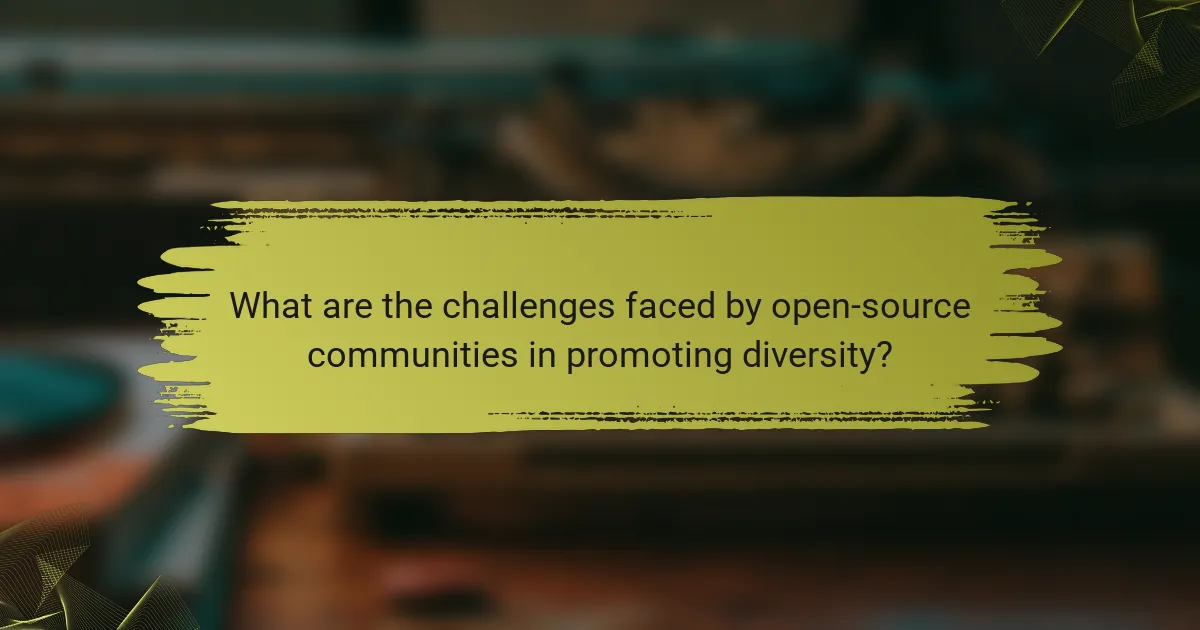
What are the challenges faced by open-source communities in promoting diversity?
Open-source communities often encounter significant challenges in promoting diversity, including resistance to change and a lack of resources. These obstacles can hinder efforts to create inclusive environments that welcome individuals from various backgrounds.
Resistance to change within established communities
Established open-source communities may resist changes aimed at increasing diversity due to entrenched norms and practices. This resistance can manifest as skepticism towards new members or reluctance to adopt inclusive policies, making it difficult for diverse voices to be heard.
To overcome this, communities should actively engage in discussions about the benefits of diversity and inclusion. Hosting workshops or forums can help facilitate understanding and encourage members to embrace new perspectives.
Lack of resources for outreach and support
Many open-source projects struggle with limited resources dedicated to outreach and support for underrepresented groups. This lack of funding or manpower can result in missed opportunities to connect with diverse talent and provide necessary mentorship.
Communities can address this challenge by seeking partnerships with organizations focused on diversity in tech. Additionally, applying for grants or sponsorships can help secure the resources needed to implement outreach programs effectively.
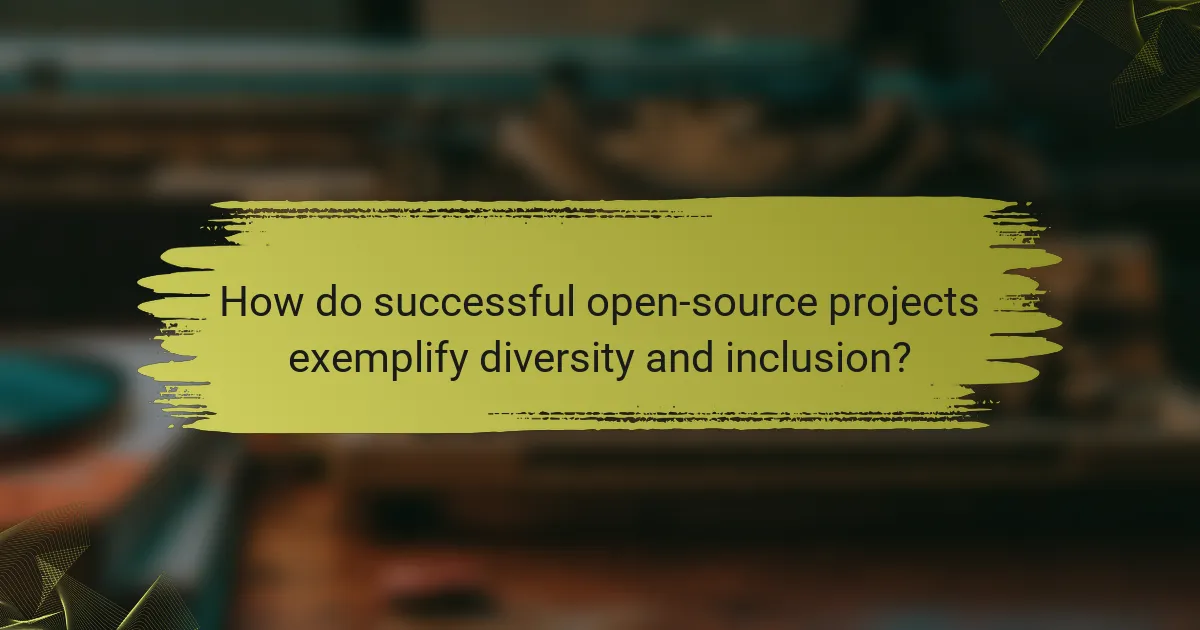
How do successful open-source projects exemplify diversity and inclusion?
Successful open-source projects demonstrate diversity and inclusion by actively engaging contributors from various backgrounds and creating environments where all voices are valued. These projects implement policies and practices that promote equitable participation, ensuring that diverse perspectives enhance innovation and problem-solving.
Mozilla’s commitment to diverse contributors
Mozilla has established a strong commitment to fostering diversity among its contributors by implementing targeted outreach programs and mentorship initiatives. They focus on recruiting individuals from underrepresented groups in tech, including women, people of color, and [censured] individuals, to ensure a broad range of perspectives in their projects.
Additionally, Mozilla offers resources such as training sessions and workshops aimed at skill development for new contributors. This support helps to create a welcoming atmosphere, encouraging individuals to participate and contribute effectively.
Apache Software Foundation’s inclusive governance
The Apache Software Foundation (ASF) promotes inclusion through its governance model, which emphasizes meritocracy and community-driven decision-making. By ensuring that all contributors have a voice in the project’s direction, ASF fosters an environment where diverse opinions are respected and valued.
ASF also implements guidelines that encourage respectful communication and collaboration among members. This approach not only enhances participation from various demographics but also strengthens the overall community by leveraging a wide array of experiences and skills.
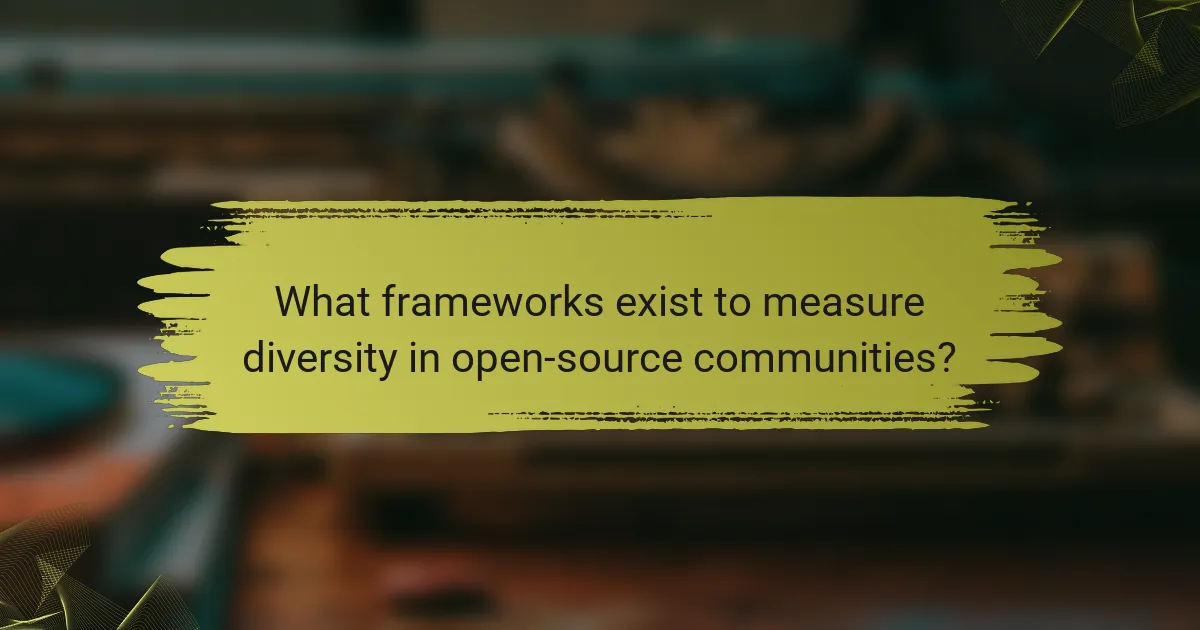
What frameworks exist to measure diversity in open-source communities?
Frameworks for measuring diversity in open-source communities often focus on gathering quantitative and qualitative data to assess representation and inclusion. These frameworks can help identify gaps and inform strategies to foster a more diverse environment.
Diversity metrics and reporting standards
Diversity metrics typically include demographic data such as gender, ethnicity, and age, which can be collected through community registration forms or participation logs. Reporting standards, such as the Open Source Diversity and Inclusion (OSDI) guidelines, provide a framework for consistent data collection and reporting, enabling communities to benchmark their diversity efforts.
Communities may also adopt the Diversity and Inclusion (D&I) scorecard approach, which evaluates various aspects of participation, including leadership roles and contribution rates. This helps in understanding the effectiveness of diversity initiatives over time.
Community surveys and feedback mechanisms
Surveys are a crucial tool for gathering feedback on the experiences of community members regarding diversity and inclusion. Regularly conducted surveys can assess perceptions of inclusivity, barriers to participation, and suggestions for improvement. Tools like Google Forms or dedicated platforms can facilitate this process.
In addition to surveys, feedback mechanisms such as open forums or discussion boards allow community members to voice their concerns and share experiences. Implementing anonymous feedback options can encourage more honest responses, helping communities to address issues effectively and adapt their strategies accordingly.
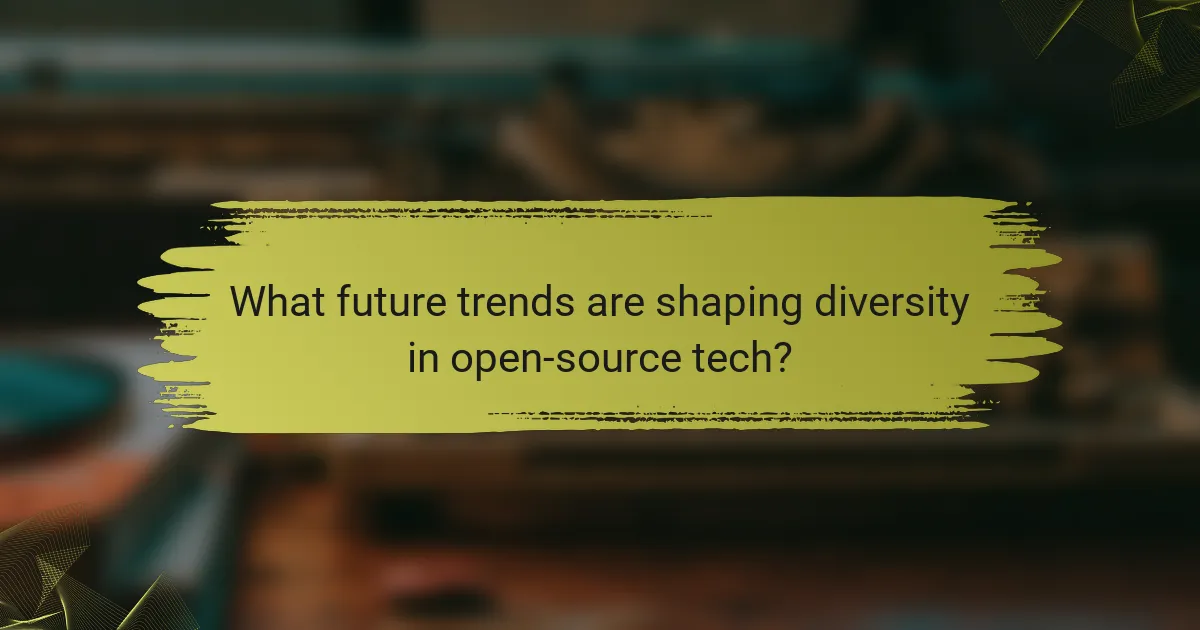
What future trends are shaping diversity in open-source tech?
Future trends in open-source tech are increasingly focused on enhancing diversity and inclusion through innovative practices and collaborative tools. These trends aim to create environments where underrepresented groups can contribute meaningfully and feel valued within the community.
Emergence of new collaborative platforms
New collaborative platforms are transforming how open-source projects operate, making them more accessible to diverse contributors. Tools like GitHub, GitLab, and others provide user-friendly interfaces and features that facilitate collaboration across geographical and cultural boundaries.
These platforms often include built-in communication tools, issue tracking, and project management features that help streamline contributions. For instance, using GitHub’s pull request system allows contributors to propose changes easily, fostering a more inclusive environment where everyone can participate regardless of their technical background.
Additionally, many of these platforms are adopting features that support multiple languages and accessibility options, further broadening participation. Open-source projects that leverage these platforms can implement mentorship programs to guide new contributors, ensuring they feel welcomed and supported.
